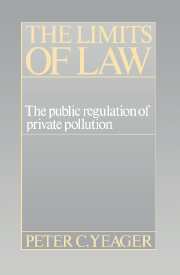Book contents
- Frontmatter
- Contents
- Preface
- Acknowledgments
- 1 The social production of business offenses
- 2 Bringing the law back in: an integrated approach
- 3 The politics of water: pollution policies to 1970
- 4 Contradiction and change: environmental consciousness and the mobilization of law
- 5 Legislating clean water: changing conceptions of environmental rights
- 6 Controls and constraints: from law to regulation
- 7 Enforcement: the social production of environmental offenses
- 8 Ecology, economy, and the evolution of limits
- Bibliography
- Index
3 - The politics of water: pollution policies to 1970
Published online by Cambridge University Press: 23 May 2010
- Frontmatter
- Contents
- Preface
- Acknowledgments
- 1 The social production of business offenses
- 2 Bringing the law back in: an integrated approach
- 3 The politics of water: pollution policies to 1970
- 4 Contradiction and change: environmental consciousness and the mobilization of law
- 5 Legislating clean water: changing conceptions of environmental rights
- 6 Controls and constraints: from law to regulation
- 7 Enforcement: the social production of environmental offenses
- 8 Ecology, economy, and the evolution of limits
- Bibliography
- Index
Summary
The attitude that law in any society will assume toward nature will be determined by the kind of value each particular culture assigns to its environment.
Earl Finbar Murphy, Man and His EnvironmentHistorically, the cultural value assigned to water has varied directly with the role of this vital substance in the reproduction of human life. At the most fundamental level, of course, water consumption is necessary for the very maintenance of life, so the earliest human communities had to orient their existences around available sources. The value of water was clear to all, and unquestioned.
Nonetheless, competition over the use of scarce vital resources is inevitable. Competition over water access has occasioned wars. Indeed, the word “rival” is derived from a term in Roman law (rivalis) indicating individuals who shared the water of a stream or brook (Burch, 1970: 1). Thus, conflict over water has its roots in antiquity.
Water pollution itself predates antiquity. To the extent that such pollution “is taken to mean the depletion of oxygen, with consequent septic conditions, such as offensive odors, floating masses of sludge, and death of fish and other aquatic life, then pollution is undoubtedly older than recorded history,” and even human communities (Benarde, 1970: 132). Even nature's own cycles can create pollution, as when leaves fall into waterways and decay.
Although of ancient origin, the pollution of water sources – and the social conflict implicit in their control and distribution – deepened radically only recently in human history, with population growth, urbanization, and industrialization.
- Type
- Chapter
- Information
- The Limits of LawThe Public Regulation of Private Pollution, pp. 51 - 83Publisher: Cambridge University PressPrint publication year: 1991



